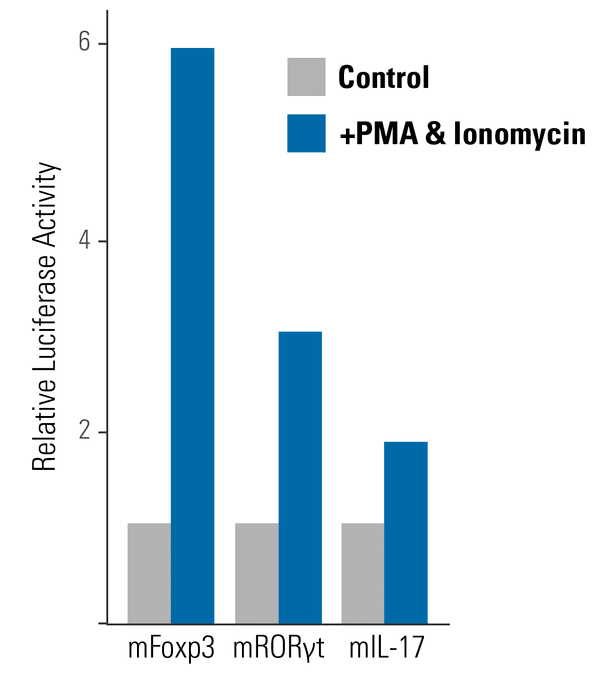Mouse IL-17 Promoter GreenFire Lentivector
- Zhang F, et al. Interactions among the transcription factors Runx1, RORγt and Foxp3 regulate the differentiation of interleukin 17-producing T cells. Nat Immunol. 2008 Nov; 9(11):1297-306. PMCID: PMC4778724.
Products
| Catalog Number | Description | Size | Price | Quantity | Add to Cart | |||
|---|---|---|---|---|---|---|---|---|
| TCL700A-1 | Mouse IL-17 Promoter GreenFire lentivector plasmid | 10 µg | $681 |
|
||||
Overview
Overview
Monitor the balance of T cell dynamics in autoimmunity, inflammation, and cancer
Simplify your studies of T cell dynamics with SBI’s ready-to-use, pre-built Treg and Th17 vectors and cell lines. With the Mouse IL-17 Promoter GreenFire Lentivector with Puro you can combine SBI’s well-regarded and high quality lentivector technology with an IL-17 promoter-reporter architecture that enables easy and quantitative monitoring of IL-17 expression. The IL-17 promoter drives coordinated expression of GFP and luciferase reporters. The vector also includes a puromycin marker for selection.

The promoter sequences and design are based upon Zhang, et al. (2008)1.
References- Zhang F, et al. Interactions among the transcription factors Runx1, RORγt and Foxp3 regulate the differentiation of interleukin 17-producing T cells. Nat Immunol. 2008 Nov; 9(11):1297-306. PMCID: PMC4778724.
How It Works
Supporting Data
Supporting Data
Luciferase activation in response to IL-17 transcriptional activators
Figure 1. SBI’s GreenFire Lentivector reporters for mFoxp3, mRORγt, and mIL-17 show strong luciferase activity in response to known transcriptional activators. METHODS: Human Jurkat T cells were transduced with lentivirus for the Foxp3, RORγt and IL-17 promoter reporters. Transcription activation was tested using stimulation through the addition of with PMA (5 ng/ml) and Ionomycin (500 ng/ml). Cells were harvested after 24 hours and luciferase activity measured for transcription activation responses.
FAQs
Resources
Related Products
Citations
Products
| Catalog Number | Description | Size | Price | Quantity | Add to Cart | |||
|---|---|---|---|---|---|---|---|---|
| TCL700A-1 | Mouse IL-17 Promoter GreenFire lentivector plasmid | 10 µg | $681 |
|
||||
Overview
Overview
Monitor the balance of T cell dynamics in autoimmunity, inflammation, and cancer
Simplify your studies of T cell dynamics with SBI’s ready-to-use, pre-built Treg and Th17 vectors and cell lines. With the Mouse IL-17 Promoter GreenFire Lentivector with Puro you can combine SBI’s well-regarded and high quality lentivector technology with an IL-17 promoter-reporter architecture that enables easy and quantitative monitoring of IL-17 expression. The IL-17 promoter drives coordinated expression of GFP and luciferase reporters. The vector also includes a puromycin marker for selection.

The promoter sequences and design are based upon Zhang, et al. (2008)1.
References- Zhang F, et al. Interactions among the transcription factors Runx1, RORγt and Foxp3 regulate the differentiation of interleukin 17-producing T cells. Nat Immunol. 2008 Nov; 9(11):1297-306. PMCID: PMC4778724.
How It Works
Supporting Data
Supporting Data
Luciferase activation in response to IL-17 transcriptional activators
Figure 1. SBI’s GreenFire Lentivector reporters for mFoxp3, mRORγt, and mIL-17 show strong luciferase activity in response to known transcriptional activators. METHODS: Human Jurkat T cells were transduced with lentivirus for the Foxp3, RORγt and IL-17 promoter reporters. Transcription activation was tested using stimulation through the addition of with PMA (5 ng/ml) and Ionomycin (500 ng/ml). Cells were harvested after 24 hours and luciferase activity measured for transcription activation responses.


